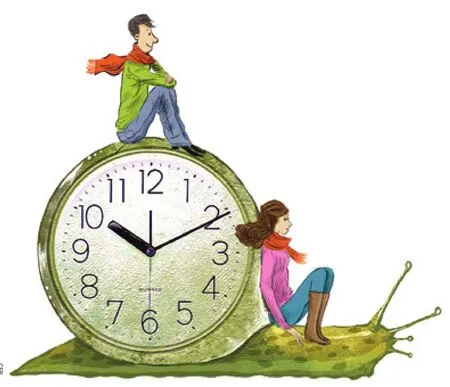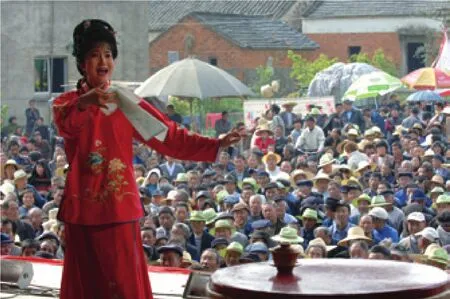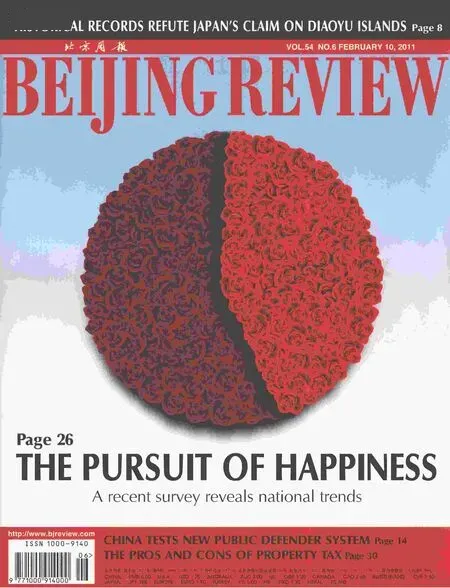Slowing Down
By WANG HAIRONG
Slowing Down
By WANG HAIRONG
A slower pace of life has become fashionable to more urbanites

Life was almost all work and no play for Shi Ming, a 40-something worker at a research institute in Beijing, before a heart attack two years ago.
As a researcher, he did not just read and write reports in the office, conduct on-site studies, attend academic meetings and tutor graduate students, but also traveled around negotiating projects and signing contracts.
The days used to be slow in the government-funded research institute where Shi works. Back then, researchers’ incomes were low and not pegged to their performance. They did what was assigned to them, and enjoyed life. Some of Shi’s colleagues often gathered to play poker during the lunch break and in late afternoon.
The reform of science and technology management system, started in the 1980s,changed the method of funding research institutes. Researchers doing applied research were encouraged to serve market needs,whereas those doing basic research were to compete for grants from a state foundation.Individual researchers earning more grants and contracts would make more money.
Since then, noisy poker games have disappeared from of fi ce buildings. Many researchers work extra hours on evenings and weekends.
Shi didn’t want to lag behind others either in terms of achievements or income,and put his heart and mind to work. He left his daughter completely in the care of his parents.
Full of drive, Shi made his way up from average engineer to associate professor and professor in several years, and became the head of a research department. He bought a car and house and sent his daughter to one of Beijing’s best schools.
But, a massive heart attack almost killed him in 2009. Doctors told Shi he must slow down to recover and maintain his health.
Now, Shi takes walks in the morning,and often drives to the suburbs to spend the weekend with his family.
Hurried life
“In essence, slow living means a return to a natural and harmonious lifestyle.”
—Hong Zhaoguang, a senior consultant for the Ministry of Health and Vice President of China Elder Health Care Association
Shi’s case is not exceptional.
Many people are spinning like tops in China’s metropolitan cities. Because of a fast work pace, urban white-collar workers are subject to mental stress. They get up early and go to bed late, spend hours commuting,eat irregular meals and live sedentary lives.All these take a toll on their health, medical experts say.
All work and no play do make people dull. According to a survey conducted by the Ministry of Health in 10 large Chinese cities,49 percent of urban white collar workers felt exhausted, 46 percent dull and 38 percent anxious. Soaring housing prices, parents’health, marriage and children’s education are four major sources of their stress.
The survey also shows 48 percent of Chinese urban employees suffer from sub-health problems. Sub-health is a state between health and illness, which features physiological function deterioration. This is most obvious in economically developed Beijing, Shanghai and Guangdong Province,where about three quarters of the residents are in poor health.
Fast living can cause even more serious physical and mental problems. For instance,several doctors with the No.1 Affiliated Hospital of Guangxi Traditional Chinese Medicine University recently published a study revealing the fast life is positively associated with Type II diabetes.
Living differently
Now, some urban white-collar workers are gradually changing the lifestyle and beginning to endorse the idea of slow living.
“When you spin around like a machine wheel in pursuit of a quality life, quality life has already eluded you,” said an advocate of slow living at Douban.com, one of China’s largest online communities.
Three years ago in Tianjin, several young people started a slow life club as an escape from the hectic metropolitan life.
“In recent years, I often hear people around me saying they are busy, tired and stressed out and I see people toiling all day long to pay back housing, car and credit card debt,” said Yang Yue, one of the club’s founders, in an interview withTianjin Daily.
The club is located in a creative industry park along Haihe River that runs through Tianjin from west to east. The club gets in touch with young white-collar workers through groups on social networking websites such as Douban.com or QQ.com. These young people get together for movies, reading, travel, photography, cooking or just chatting.
Ma Yongmei, another founder, said every weekend, more and more people gathered at the club. “Most people coming to the club hanker for a simple lifestyle,” she said.
Slow living would make your life more wonderful, said Hong Zhaoguang, a senior consultant for the Ministry of Health and Vice President of China Elder Health Care Association, at a recent interview with the Beijing Television Station.
“Here, ‘slow’ is not equivalent to lazy or slacking,” Hong said. “In essence, slow living means a return to a natural and harmonious lifestyle.”
Hong suggests people not bring work home, not work extra hours and not check e-mail or make work-related calls on weekends.
Instead, he said, one should plan some time for physical exercise, cooking, reading,gardening or simply relaxing, because all these contribute to longevity.
Pancakes are popular fast food snacks in Beijing, as it is convenient for people to grab one on the street and munch it while they wait for the subway train or bus when going to work in the morning.
Recently, a survey conducted by BeijingbasedLife Timesand Web portal Sohu.com show people often wolf down their meals.Of the 2,743 respondents, 43.31 percent said their quickest meal in a day took only five minutes. As to why they ate so fast, 29.02 percent blamed the fast living pace.
Ma Guansheng, Deputy Director of the Institute of Nutrition and Food Safety at the Chinese Center for Disease Prevention and Control, said the Dietary Guidelines for Chinese Residents compiled by nutritional experts recommends people spend 15-20 minutes on breakfast and about half an hour on lunch and supper.
Eating slowly and chewing more has many health benefits. Experts say chewing can stimulate people to secrete saliva and gastric acid, which make food easier to digest; chewing food more slowly can also help people lose weight; eating slow can also reduce stress.
A slow food movement was initiated by Italian journalist Carlo Petrini. In 1986,he protested the opening of a McDonald’s restaurant in Rome, sparking an international slow movement.
Slow Food, a non-pro fi t association, was founded in 1989 in Italy to counter the rise of fast food and fast life, the disappearance of local food traditions and people’s dwindling interest in the food.
The organization uses the image of a snail as its logo and now has supporters in 150 countries around the world.
Slow food is embraced by a group of Chinese netizens active on Douban.com.One netizen known as Little CM said, “I do not understand why so many people like KFC and McDonald’s. My ideal day starts with a breakfast consisting of scrambled egg,a cup of milk and a self-baked cake, which I leisurely enjoy. Then I stir-fry several dishes for lunch and share them with friends.”
“Fast living in cities is distorting our life and environment. We should resist fast living, starting with slow food,” Zhao Zeming,a member of a Slow Food organization toldHangzhou Daily, a local newspaper in Zhejiang Province.
Slow food used to be a tradition, now it had become a fashion, Zhao said.
Slow city
Cittaslow International, literally Slow City,was founded in Tuscany, Italy in 1999. It is a sister organization of Slow Food. Cittaslow has resisted the fast-lane, homogenized world so often seen in other cities. It celebrates diversity of culture and specialties of a town.
A snail is also used by Cittaslow as an icon for slow cities. Currently, there are 135 accredited slow cities in 24 countries around the world.
At the end of 2010, Yaxi in Gaochun County in east China’s Jiangsu Province, was given the title of “slow city” by Cittaslow.It is the first Chinese region accredited by Cittaslow.
The tiny town, with a population of just 20,000, has 49 square km of fields for organic tea, Chinese herbs and orchards.
When Angelo Vassallo, Vice President of Cittaslow, visited Yaxi for the fi rst time, he was deeply impressed by local natural and cultural resources, said Zuo Niansheng, Editor in Chief of local newspaper,Gaochun Today.
Most Chinese cities, with their large populations, are disquali fi ed from this title by one criterion of Cittaslow. “The criterion is very selective at the moment, and no town or city with more than 50,000 residents can be called a slow city,” said Cittaslow Chairman Pier Giorgio Oliveti.
Wang Hongtao, a resident in Yaxi, toldChina Dailyhe probably had a higher happiness index than those living in big cities like Beijing or Shanghai.
That is probably true. Last October,national TV broadcaster CCTV rated China’s happiest cities, and many affluent but fast-paced cities such as Guangzhou and Shenzhen were not on the list.
CCTV’s rating is based on a survey on residents in 104 cities and 300 county seats all over the country. A total of 88,000 questionnaires were returned.

EASY LIFE: A local opera performance in Yaxi, Jiangsu Province, the first “slow city”in China accredited by Cittaslow International

